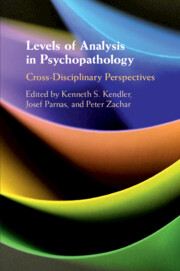Book contents
- Levels of Analysis in Psychopathology
- Advance Praise for Levels of Analysis in Psychopathology
- Levels of Analysis in Psychopathology
- Copyright page
- Contents
- Figures
- Tables
- Contributors
- Preface
- General Introduction
- Part I Neuroscience, Mechanisms, and RDoC
- Part II Phenomenology, Biological Psychology, and the Mind–Body Problem
- Part III Taxonomy, Integration, and Multiple Levels of Explanation
- Section 8
- Section 9
- Section 10
- Section 11
- 31 Introduction
- 32 Approaches to Multilevel Models of Fear: The What, Where, Why, How, and How Much?
- 33 Schaffner on Levels and Selves
- Section 12
- Section 13
- Section 14
- Section 15
- Index
- References
31 - Introduction
from Section 11
Published online by Cambridge University Press: 02 April 2020
- Levels of Analysis in Psychopathology
- Advance Praise for Levels of Analysis in Psychopathology
- Levels of Analysis in Psychopathology
- Copyright page
- Contents
- Figures
- Tables
- Contributors
- Preface
- General Introduction
- Part I Neuroscience, Mechanisms, and RDoC
- Part II Phenomenology, Biological Psychology, and the Mind–Body Problem
- Part III Taxonomy, Integration, and Multiple Levels of Explanation
- Section 8
- Section 9
- Section 10
- Section 11
- 31 Introduction
- 32 Approaches to Multilevel Models of Fear: The What, Where, Why, How, and How Much?
- 33 Schaffner on Levels and Selves
- Section 12
- Section 13
- Section 14
- Section 15
- Index
- References
Summary
In his chapter, Ken Schaffner dives into the variety of levels that are invoked in both the traditional fear center model and Joe LeDoux and Danny Pine’s (2016) two-system model of fear. In many ways, LeDoux wrote the book on the biology of fear conditioning and for him to claim (with Pine and others) that rodent models can never fully represent the biology of human fear has incredible gravitas.
- Type
- Chapter
- Information
- Levels of Analysis in PsychopathologyCross-Disciplinary Perspectives, pp. 379 - 383Publisher: Cambridge University PressPrint publication year: 2020



